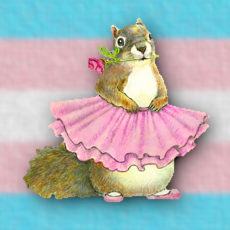-
Who's Online 5 Members, 0 Anonymous, 92 Guests (See full list)
- MaryEllen
- KymmieL
- Kylie
- Stefi
- Carolyn Marie
-
Recently Browsing 0 members
- No registered users viewing this page.
-
Forum Statistics
-
Total Topics80.8k
-
Total Posts770.5k
-
-
Member Statistics
-
Total Members12,119
-
Most Online8,356
Newest Member
Silkfan
Joined -
-
Today's Birthdays
-
 Clara_D
Clara_D
(53 years old) -
Deborah121
(64 years old) -
 Kerry_Autumn
Kerry_Autumn
(38 years old) -
OC
-
-
Posts
-

By Kylie · Posted
Hi all! I’ve been here numerous years and followed discussions in the shadows. I began my medical transition in 2018. Lost a lot of friends and family, but grew so much along the way! Fast forward to the surgical journey. August 2020 - Vaginoplasty I underwent my vaginoplasty in Austin TX during the start of COVID. It was a rough recovery. I suffered some separation of stitches which landed me having physical restrictions. I then began suffering from hypergranulation within my canal which led me to seeing the GYN twice a week for 13 weeks for silver nitrate treatments. The silver nitrate ended up causing stenosis which led to my next surgery. April 2021 - Surgical Revision I had a revision of my vaginal canal which helped with dilation…for only 3 weeks! I underwent about 10 months of pelvic floor therapy to no avail. Dilation was near impossible. So this led to my next revision. April 2022 - Revision and Breast Augmentation This surgery I decided to do my breast augmentation concurrently. The breast augmentation went phenomenal, no pain, 575cc Silicone implants. Awesome results. The vaginal revision, both my primary surgeon and an additional surgeon with expertise in complicated pelvic disorders performed the revision together. immediately I felt amazing after with no issues dilating! I am now 2 years post final revision and have no issues dilating once a week and have sex with no problem! March 2024- Facial Feminization Surgery I decided to have FFS after much thought. I had it done at Duke University. I had the following done: -Type 3 forehead reconstruction and sinus setback -Cheek implants - Orbital contouring - Sliding Genioplasty -Submental liposuction Recovery was not bad. First 5 days were a tad sore and uncomfortable- but honestly minimal pain. Surgeons Vaginoplasty- Dr. Ashley DeLeon Breast Augmentation- Dr. Gerhard Mundinger FFS- Dr. Elda Fisher I’m happy to answer any questions! Kylie -

-

By Carolyn Marie · Posted
That's very lovely, @vidanjali, and very thoughtful. Carolyn Marie -

By VickySGV · Posted
Contrary to some recommendations we make for members, the Vicky part is just my legal FN and the SGV does give my home location within a few hundred square miles. When I joined here the Vicky all by itself was taken so I had to add something else to it. -

By Vidanjali · Posted
Vidanjali is a combination of the Sanskrit words "vidya" and "anjali". Vidya means intuitive knowledge or divine knowledge (where its antonym is ignorance) and anjali means offering. For example, in yoga, anjali mudra is the position of hands in prayer at the heart center. So, Vidanjali expresses my desire to be an instrument of illumination and goodwill in the world and to be of service to others. -

By Vidanjali · Posted
My pleasure. I am looking forward to reading it too. I also recommend the Saslow book. Amazing story. For all, here is the synopsis of Black's new book. Any you'll notice the use of they/them pronouns. "When coded language and creeping authoritarianism spread the ideas of white nationalists, this is an essential book with a powerful voice. Derek Black was raised to take over the white nationalist movement in the United States. Their father, Don Black, was a former Grand Wizard in the Ku Klux Klan and started Stormfront, the internet’s first white supremacist website—Derek built the kids’ page. David Duke, was also their close family friend and mentor. Racist hatred, though often wrapped up in respectability, was all Derek knew. Then, while in college in 2013, Derek publicly renounced white nationalism and apologized for their actions and the suffering that they had caused. The majority of their family stopped speaking to them, and they disappeared into academia, convinced that they had done so much harm that there was no place for them in public life. But in 2016, as they watched the rise of Donald Trump, they immediately recognized what they were hearing—the spread and mainstreaming of the hate they had helped cultivate—and they knew that they couldn’t stay silent. This is a thoughtful, insightful, and moving account of a singular life, with important lessons for our troubled times. Derek can trace a uniquely insider account of the rise of white nationalism, and how a child indoctrinated with hate can become an anti-racist adult. Few understand the ideology, motivations, or tactics of the white nationalist movement like Derek, and few have ever made so profound a change." -

By Sally Stone · Posted
This is going on my read list. Thanks for posting. -

By Sally Stone · Posted
I am always fascinated and curious about the names we choose for ourselves on this forum. Many have me very curious as to the history/reason behind them. If it's not prying too much and you are willing to share, it would be great to hear the why behind your choice. I'm actually a little jealous of the creativity here, as my name is anything but creative. It's just my actual girl name. Very boring, I know. But so many of you out there have such unique and thought provoking forum names. -

By Vidanjali · Posted
Greeting & welcome to you, Bobbi! What's your latest good recipe find? -

By Vidanjali · Posted
P.S. Also noting that the synopsis given for the Saslow book was before Black came out and began using they/them pronouns. No disrespect meant. -

By Vidanjali · Posted
Also, before posting any comments here please remember this is the news forum, not the politics forum. -

By Vidanjali · Posted
https://www.them.us/story/former-white-nationalist-kkk-r-derek-black-memoir-trans According to the article, Derek uses they/them pronouns. I read the book about Derek Back called "Rising Out of Hatred: The Awakening of a Former White Nationalist" by Eli Saslow when it came out a few years ago. Absolutely remarkable and inspiring story. Now Black has a new book coming out, "The Klansman's Son, My Journey from White Nationalism to Antiracism". This is the synopsis of the Saslow book which gives you a snapshot of Black's journey. "Derek Black grew up at the epicenter of white nationalism. His father founded Stormfront, the largest racist community on the Internet. His godfather, David Duke, was a KKK Grand Wizard. By the time Derek turned nineteen, he had become an elected politician with his own daily radio show—already regarded as the "the leading light" of the burgeoning white nationalist movement. "We can infiltrate," Derek once told a crowd of white nationalists. "We can take the country back." Then he went to college. At New College of Florida, he continued to broadcast his radio show in secret each morning, living a double life until a classmate uncovered his identity and sent an email to the entire school. "Derek Black ... white supremacist, radio host ... New College student???" The ensuing uproar overtook one of the most liberal colleges in the country. Some students protested Derek's presence on campus, forcing him to reconcile for the first time with the ugliness of his beliefs. Other students found the courage to reach out to him, including an Orthodox Jew who invited Derek to attend weekly Shabbat dinners. It was because of those dinners—and the wide-ranging relationships formed at that table—that Derek started to question the science, history, and prejudices behind his worldview. As white nationalism infiltrated the political mainstream, Derek decided to confront the damage he had done. Rising Out of Hatred tells the story of how white-supremacist ideas migrated from the far-right fringe to the White House through the intensely personal saga of one man who eventually disavowed everything he was taught to believe, at tremendous personal cost. With great empathy and narrative verve, Eli Saslow asks what Derek Black's story can tell us about America's increasingly divided nature." -

By Ivy · Posted
The sports thing is problematic. Whenever a trans girl does well it just hits the fan. Just this morning I saw something about it again. I live maybe 10 miles from the SC border. I suspect the people here are similar. When I'm out and about most people are polite, and don't seem offended by me - and I don't pass well. I believe if it wasn't for the GOP fanning the flames this wouldn't be half as big an issue. -

By VickySGV · Posted
My applause and congratulations to them from a member of the Episcopal Church of the U.S. who's beliefs for full Trans inclusion at all levels of the church were established by our General Convention of laity and clergy in 2015 are in full harmony and congruence with those resolutions you have reported. -
-
-
Upcoming Events
-

Recommended Posts
Create an account or sign in to comment
You need to be a member in order to leave a comment
Create an account
Sign up for a new account in our community. It's easy!
Register a new accountSign in
Already have an account? Sign in here.
Sign In Now